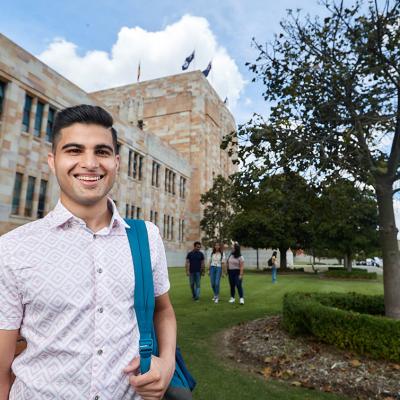If you’re an Australian university student, or looking to become one, you may have heard of Commonwealth Supported Places, or CSPs.
It can help you pay your tuition fees and reduces some of the financial stress involved with starting uni.
Here’s how Commonwealth Supported Places work.
UQ has CSPs available for postgraduate study across many study areas, so you could be eligible for a CSP masters, graduate certificate or graduate diploma. Read on to find out how you can get reduced tuition fees to upskill and increase your employability.
What does Commonwealth Supported Place mean?
When you secure a Commonwealth Supported Place in a university program, it means that the Australian Government will pay part of your tuition fees. This is a subsidy rather than a loan, so you don’t have to pay it back like other student loans.
You will have to pay the remainder of the tuition fees that the government hasn’t covered however, and this portion is called the ‘student contribution amount’. Before you start panicking and breaking open the piggy bank to fund your student contribution amount – you can use a student loan to cover this portion of your fees. It’s called a HECS-HELP loan and you do have to pay this one back eventually.
The eligibility for a CSP and HECS-HELP loan are different, so be sure to check both.
So, does everyone get a Commonwealth Supported Place? Not quite.
Who is eligible for Commonwealth Supported Places?
Commonwealth Supported Places are offered mainly for undergraduate university degrees, but some higher education providers (including UQ, surprise!) offer them for postgraduate degrees as well.
At the moment, UQ has CSPs available for almost all postgraduate programs, including CSP master's degrees, so it’s a great time to take advantage of the savings available.
As you may have guessed, you need to meet certain criteria to be eligible for a CSP. Thankfully, that criteria is quite broad – Australian and New Zealand citizens, and Australian permanent visa holders studying at public higher education providers, are all eligible for a CSP (further conditions apply) if the program they apply for is offering them.
Read the full list of eligibility requirements for CSPs
New Zealand citizens and eligible visa holders must complete all studies onshore in Australia to be eligible for a CSP.
How do I know if the degree I want to study offers CSPs?
Most Australian public universities will offer Commonwealth Supported Places to domestic students, but you can check the details of the program you’re considering on the university’s website.
Here’s how to check if the program (postgrad or undergrad) you’re interested in studying at UQ offers CSPs:
- Visit the find a program page.
- Search for your program using the text box or filters to the left.
- Click on the program so you’re taken to its dedicated webpage and then click on the 'Fees and scholarships’ tab.
If you're interested in undertaking postgraduate study at UQ, you can easily see which programs offer Commonwealth Supported Places by visiting our postgraduate fees and financial support page and scrolling down to the Commonwealth supported places (CSPs) subheading.
How much does Commonwealth Supported Place pay?
A Commonwealth Supported Place only pays for a portion of your tuition fees, and then the remainder of what you pay (the student contribution amount) depends largely on your study area/s, amongst other things like whether or not you have a scholarship. Some programs are more expensive than others, so you may find that depending on what you’re studying, your student contribution amount may be higher or lower than your peers’.
There are maximum amounts payable for the student contribution amount, as dictated by the government.
For example, in 2025, students may be paying more to study law, accounting and economics courses than agriculture, English and mathematics courses, because the maximum student contribution amount is higher for the former.
You can find more detailed information on expected tuition fees for your program of choice on your study provider’s website (for UQ, follow the steps outlined above for indicative yearly tuition fees).
To find out more about maximum student contribution amounts, visit the Australian Government’s StudyAssist website.
Oh hi, we didn’t see you there. Have we mentioned yet that you should have a little looksee at the CSPs we have available for postgrad study at UQ? Find out how much your postgrad study fees could be reduced with a Commonwealth Supported Place, and other reasons why now is the perfect time to start a postgraduate qualification. Ok, carry on being your amazing self.

How to apply for a Commonwealth Supported Place
Once you have discovered if the university program you’re interested in studying offers CSPs, you can apply for the program through your state’s Tertiary Admissions Centre (QTAC for Queensland students) or directly through the university itself (if directed to do so). When you receive your university offer, it will include information on whether you have been offered a CSP, and how to fill out the CSP application form. It will also provide information on how to access HECS-HELP to cover the student contribution amount, should you be eligible for this type of student loan.
You need to have a Unique Student Identifier (USI) to fill out the CSP application form.
What are the benefits of studying with a Commonwealth Supported Place?
We’re so glad you asked!
- The amount the government pays towards your tuition fees through a CSP can be significant. At UQ, CSPs can provide an 80% reduction on your tuition fees in some cases, leaving you with much more money to spend on study supplies and social activities.
- Depending on what you’re studying, you may find that your study area has a much lower maximum student contribution amount than others – so you could be paying less to study courses in agriculture and nursing, for example (based on 2025 maximum student contribution amounts).
- When you secure a Commonwealth Supported Place, you may also be eligible for HECS-HELP to temporarily cover your student contribution amount, meaning you have less upfront costs for your study, and more time to settle into full-time work after graduation, before paying it back.
- You can typically access your CSP for up to 7 years of full-time study (or part-time equivalent).
How hard is it to get a Commonwealth Supported Place for postgraduate study?
Here at UQ, we’re really proud to be able to offer CSPs for almost all our postgraduate programs, meaning your chances of securing reduced tuition fees for the program you're interested in is quite high. At other universities, you may need to shop around a bit before you find a CSP program related to the study area you wish to pursue. Even then, some programs only have a certain amount of Commonwealth Supported Places available, and once these are allocated, offers may be made on a full tuition fee basis. You don’t want to pick a program over one you’re more interested in, purely because it offers CSPs, only to find they’ve exhausted their allocation by the time you’re accepted.
At UQ, we’ve allocated CSPs to our postgraduate programs based on past enrolment indicators, to strive to ensure all domestic postgrad students in CSP programs have access to reduced tuition fees. So, how hard is it to get a Commonwealth Supported place for postgraduate study at UQ? If you meet the eligibility criteria and get your application in early – not hard at all.
Explore UQ’s Commonwealth Supported Place postgraduate programs
Don’t forget that UQ also offers a wide range of scholarships for postgraduate students (including international students), as well as FEE-HELP student loans (for those who are not eligible for a CSP) that can assist with your study fees.





